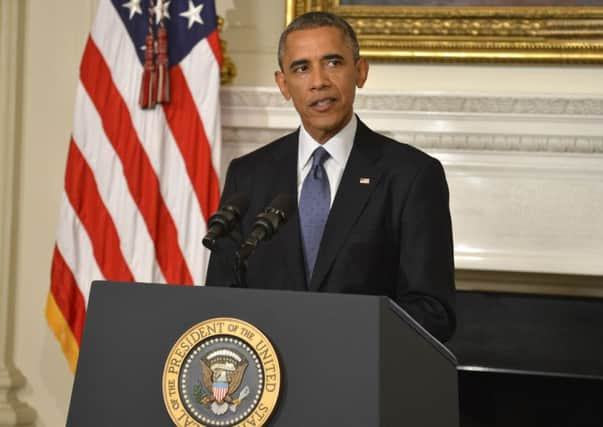Leader: IS Fanatics’ advances opens can of worms


There can be little disagreement that urgent humanitarian and military action is required. This is no civil war in which outsiders should have no role. The IS militants, bent on creating a Caliphate – a state where a very fundamental form of Islam and one that would appal most Muslims – appear to have embarked on genocide. They are killing all they come across who do not either subscribe or convert to their brand of Islam.
They have spread steadily from western Syria into northern Iraq where many non-Muslims live. They include tens of thousands of Christians, regarded as infidels by the IS and similar numbers of Yazidi, adherents to an obscure religion who many Muslims regard as devil-worshippers. All of them, almost certainly correctly, believe that no other fate than death awaits them if they fall into IS clutches.
Advertisement
Hide AdAdvertisement
Hide AdThis is a humanitarian disaster. So it is absolutely right that nations including the US and Britain, should be send as much food, water, and other aid as is necessary into the remote areas where people have fled to escape IS.
But that may only be postponing their murder if the advance of IS cannot be halted and turned back. This is arguably the job of the Iraqi military. But they have proven themselves to be abysmally inadequate despite superior equipment, training and support that the US has given them.
Self-armed and trained militias formed by Kurds, whose territory is now threatened by IS, seem to be made of stronger stuff. Nevertheless, they, too, may be overwhelmed by the zealotry and fanaticism of IS.
Thus there is a clear case on humanitarian grounds for military intervention by western powers to prevent genocidal murder on a horrifying scale. But experience strongly suggests that only soldiers on the ground will be able to drive IS out of the ground it is occupying.
But even pushing back IS into the relatively deserted areas of north-western Iraq will not be enough. This is a movement of fanaticism which sprang to life in the civil war in Syria and once that is realised, then there is a truly awful dilemma that will have to be confronted and a dark choice made.
The nasty fact is that the IS fanatics form one of the groupings opposing and fighting president Assad. Is the possibility that IS might be the victor in Syria to be contemplated? And if not, is the prospect of assisting president Assad to defeat them tolerable? Or should the West just cross fingers and hope that more moderate forces prevail? To these questions, dreadfully obviously, there are only awful answers.
Salmond must be clear on currency
ED MILIBAND has added to the pressure currently bearing down on Alex Salmond, and his contention that the rest of the UK will agree to a formal currency union with Scotland after a vote for independence, by promising that Labour will make rejection of such a union a manifesto pledge in the 2015 general election.
This, it has to be said, is not exactly a killer blow. The Labour leader will not write his manifesto for some months after the referendum, giving him ample time to reconsider. And it isn’t unknown for manifesto promises to turn out to be not worth the paper they are printed on.
Advertisement
Hide AdAdvertisement
Hide AdBut make no doubt, it does add weight to his and the other main party leaders’ stance against formal currency union. It is perhaps the clearest way he can underline his party’s opposition to the idea of a sterling union and as such it may serve the more obvious purpose of persuading more voters into the No camp.
It also increases the already considerable pressure Alex Salmond is under. It appears that Mr Salmond’s assertion that a formal currency union would be the only sensible choice for the leaders of the rest of the UK faced with Scotland not picking up its share of national debt as a consequence of their refusal to do so is not convincing wavering voters. He will have to work harder to sell that, given a formal currency union is solely in the gift of the UK leaders.
And if, as seems likely, just carrying on using the pound whether the rest of the UK likes it or not is his Plan B, then he is going to have to explain rather more clearly the potential benefits of that, too. If there is no clarity in the choices to be made, it will surely go against him.